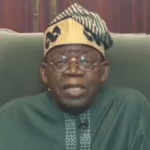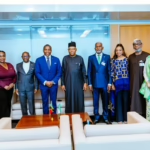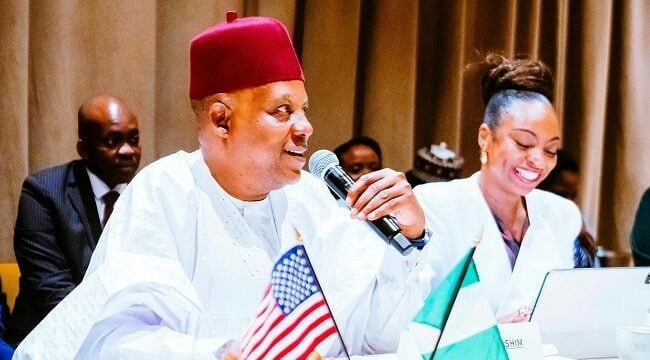Nigeria’s Vice President, Kashim Shettima, has called upon the African Union (AU) to renew its commitment to diplomacy as the foremost and most effective tool for resolving conflicts across Africa.
While recognizing the significant contributions of the AU’s Peace Support Operations (PSOs)-which are tasked with peacekeeping, peace enforcement, and monitoring efforts throughout the continent-he highlighted the substantial financial burden these missions impose.
Speaking on behalf of President Bola Tinubu during the AU Peace and Security Council meeting at the Heads of State and Government level, held alongside the 80th United Nations General Assembly (UNGA) session in New York, Vice President Shettima emphasized the need for a strategic shift.
He pointed out that with the current dynamics of the UN and the increasing involvement of traditional partners in conflicts beyond Africa, it is becoming increasingly challenging for African nations to bear the full financial responsibility of peace support operations.
“Our continent must persist in prioritizing diplomatic solutions in its efforts to prevent and resolve conflicts,” he stated. “In this context, we urge the Council to ensure that future peace operations, especially those under UN mandates, incorporate diplomatic and political frameworks that tackle the underlying causes of disputes.”
He further advocated for the integration of strategies within AU PSOs that empower national and local institutions to better anticipate crises and ease tensions before they escalate.
According to the Vice President, this approach is essential for establishing durable and self-reliant peace infrastructures wherever peace operations are deployed.
He also cautioned against the fragmentation caused by the proliferation of multiple peace initiatives on the continent, which often undermine the AU’s conflict prevention and resolution efforts.
VP Shettima expressed concern over external interference in African conflicts, including the deployment of foreign military personnel, mercenaries, and private defense contractors in some AU member states, arguing that such involvement contradicts the principles of African collective defense and security.
He urged the Council to consider issuing a communique addressing these gaps in conflict resolution and called for the immediate and unconditional withdrawal of foreign forces from AU countries.
Additionally, he stressed the urgency of overcoming barriers to the operationalization of the African Standby Force and recommended adopting a clear strategy for its deployment in conflict zones across the continent.
Highlighting the importance of collaboration, the Vice President encouraged the Council to enhance coordination and strategic engagement with regional economic communities and similar bodies.
“We believe that solidarity is key to effective conflict prevention and resolution in Africa, and working in isolation must be avoided,” he affirmed. “The AU already possesses robust mechanisms to address the evolving nature of conflicts and crises on our continent.”
Earlier in the session, Mr. Parfait Onanga-Anyanga, the UN Secretary-General’s Special Representative to the African Union and Head of the United Nations Office to the African Union, lamented the rise in armed conflicts and the decline in funding for peace initiatives. He urged member states to develop their own national frameworks for peacebuilding and conflict prevention.
“Prevention must begin domestically and align with the principles of the United Nations Charter,” Onanga-Anyanga remarked. “Regional organizations like the African Union, along with economic commissions and regional mechanisms, play a vital role in this process.”
In a related address, Vice President Shettima underscored education as the most impactful public investment, noting that each additional year of schooling boosts lifetime earnings and diminishes the likelihood of fragility and conflict.
He made these remarks during a high-level event co-hosted by the Permanent Missions of Italy and Nigeria, alongside the Global Partnership for Education (GPE), held during the UNGA 80th session in New York.
The gathering focused on the transformative potential of investing in quality education worldwide.
VP Shettima emphasized that targeted education funding tackles the root causes of instability, extreme poverty, and youth unemployment. He highlighted GPE’s role in amplifying impact through financial support, policy guidance, and incentive programs.
He explained that GPE mobilizes domestic resources and co-financing, significantly increasing the effectiveness of every dollar invested. This multiplier effect has unlocked billions in additional funding beyond GPE’s direct grants.
“GPE has a proven track record of rallying partners and delivering large-scale results,” the Vice President noted. “In 2024 alone, GPE approved over US$1.2 billion in new grants and secured more than US$1.5 billion in co-financing-clear evidence that its model succeeds when adequately funded and prioritized.”
He acknowledged that GPE’s mission depends on consistent and sufficient replenishment. Although the 2021-2025 funding cycle raised approximately US$4.2 billion-a remarkable achievement-it still falls short of what is necessary to fully revolutionize education.
VP Shettima highlighted Nigeria’s efforts to expand early childhood education, enhance teacher training, and invest in underserved regions.
“A significant GPE grant in Nigeria supports the integration of children from religious schools into mainstream education and provides teacher training across states, with a special focus on advancing girls’ education,” he explained.
The Vice President appealed to donors to protect and increase official development assistance for basic education, prioritize flexible and predictable funding to strengthen educational systems, and back targeted programs like girls’ education accelerators that yield substantial social benefits.
He concluded by stressing that full replenishment of GPE funds will unlock critical grants and technical support in countries where the impact is most needed.
“Nigeria is committed to collaborating with all partners to make GPE 2030 a milestone that delivers both scale and measurable learning outcomes for the children we serve. We hope our collective efforts will rise to meet the vast potential of our youth,” VP Shettima affirmed.

















